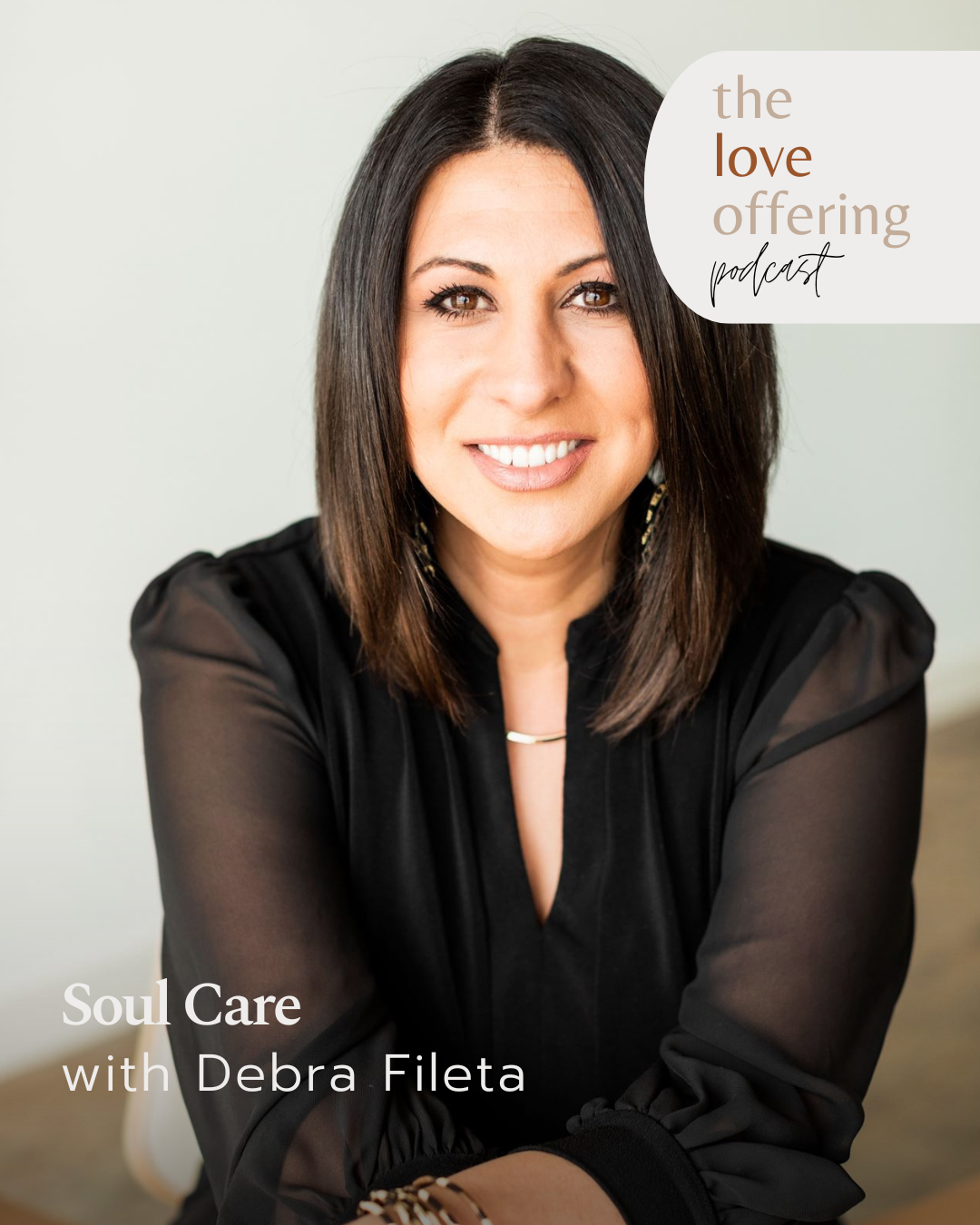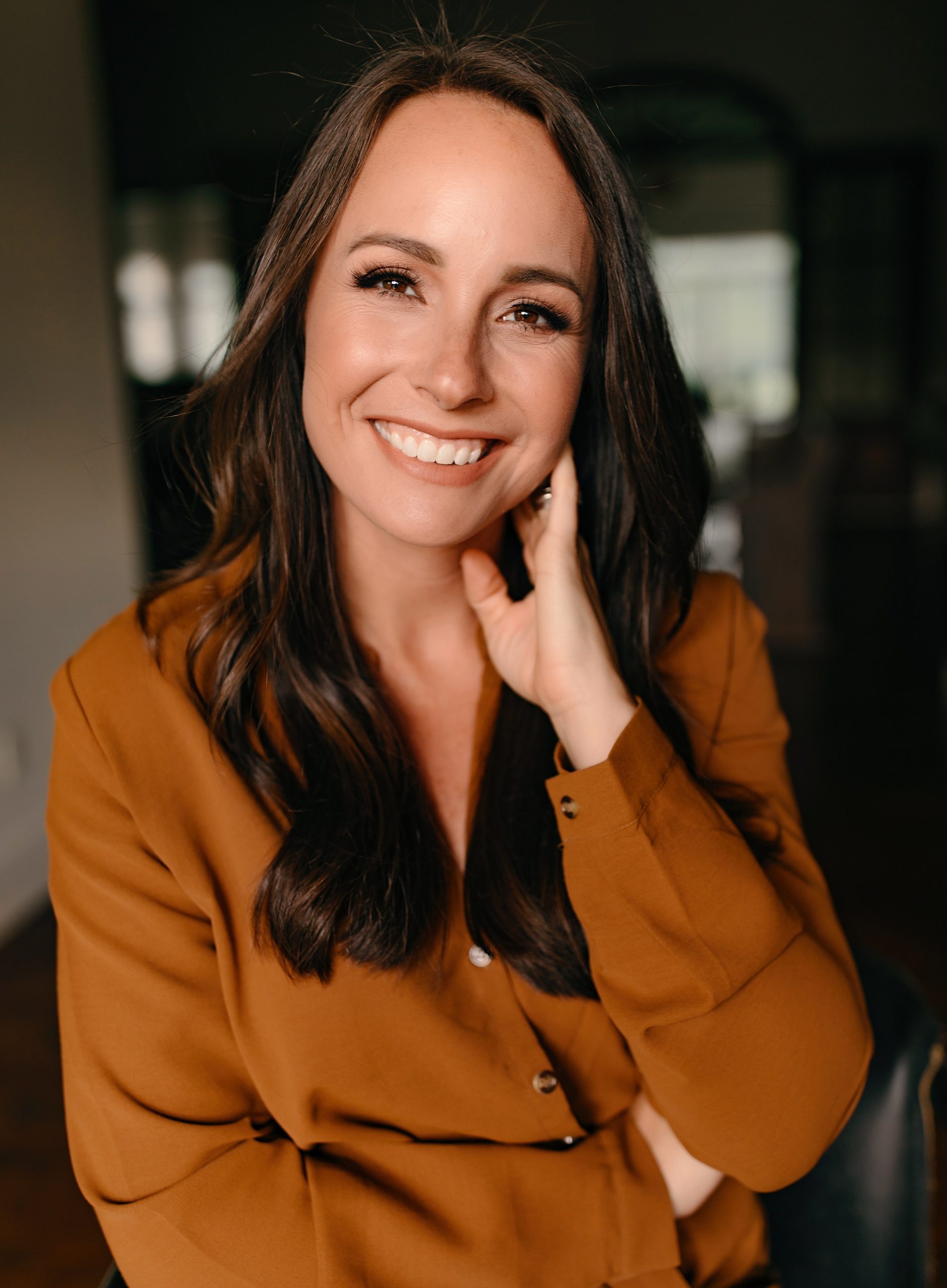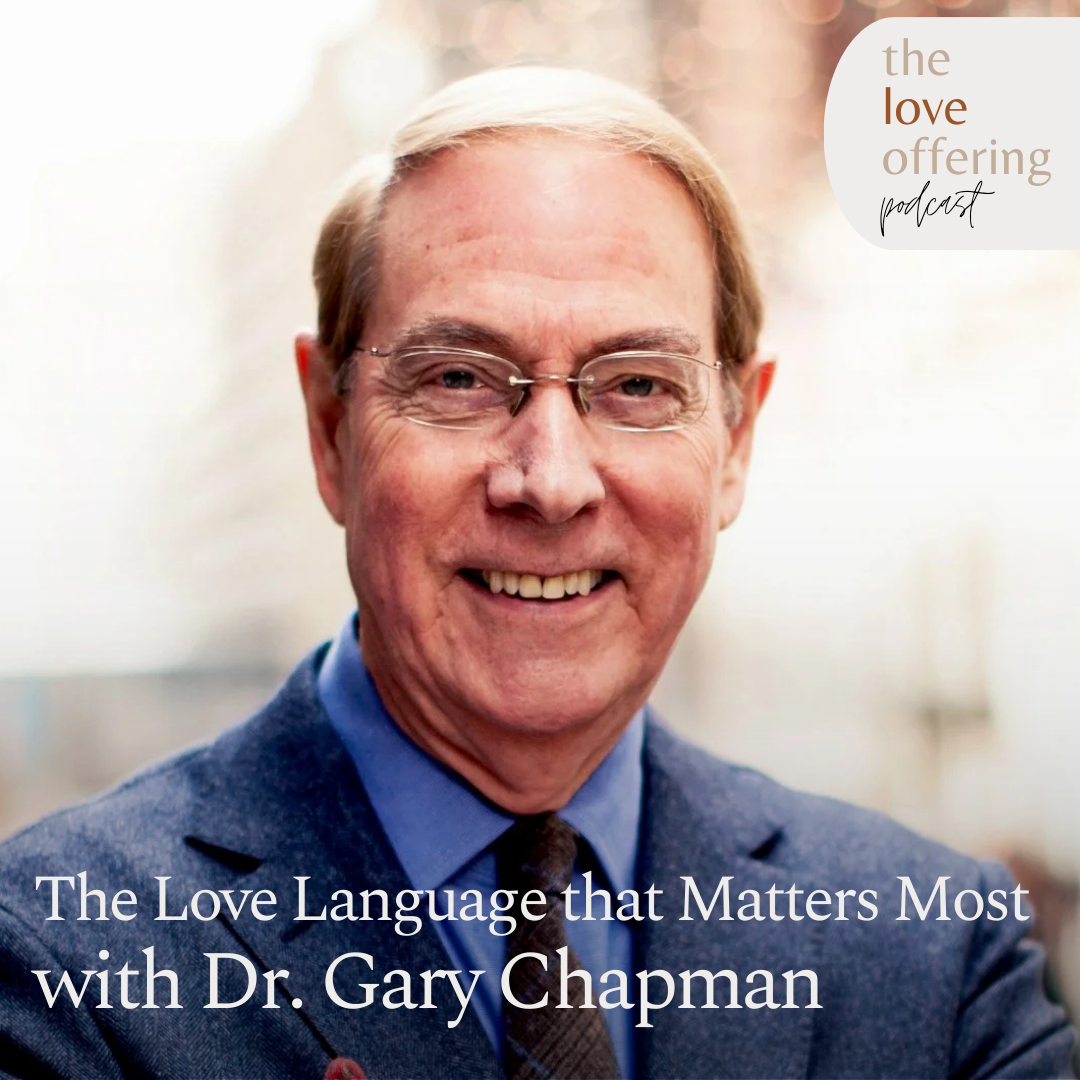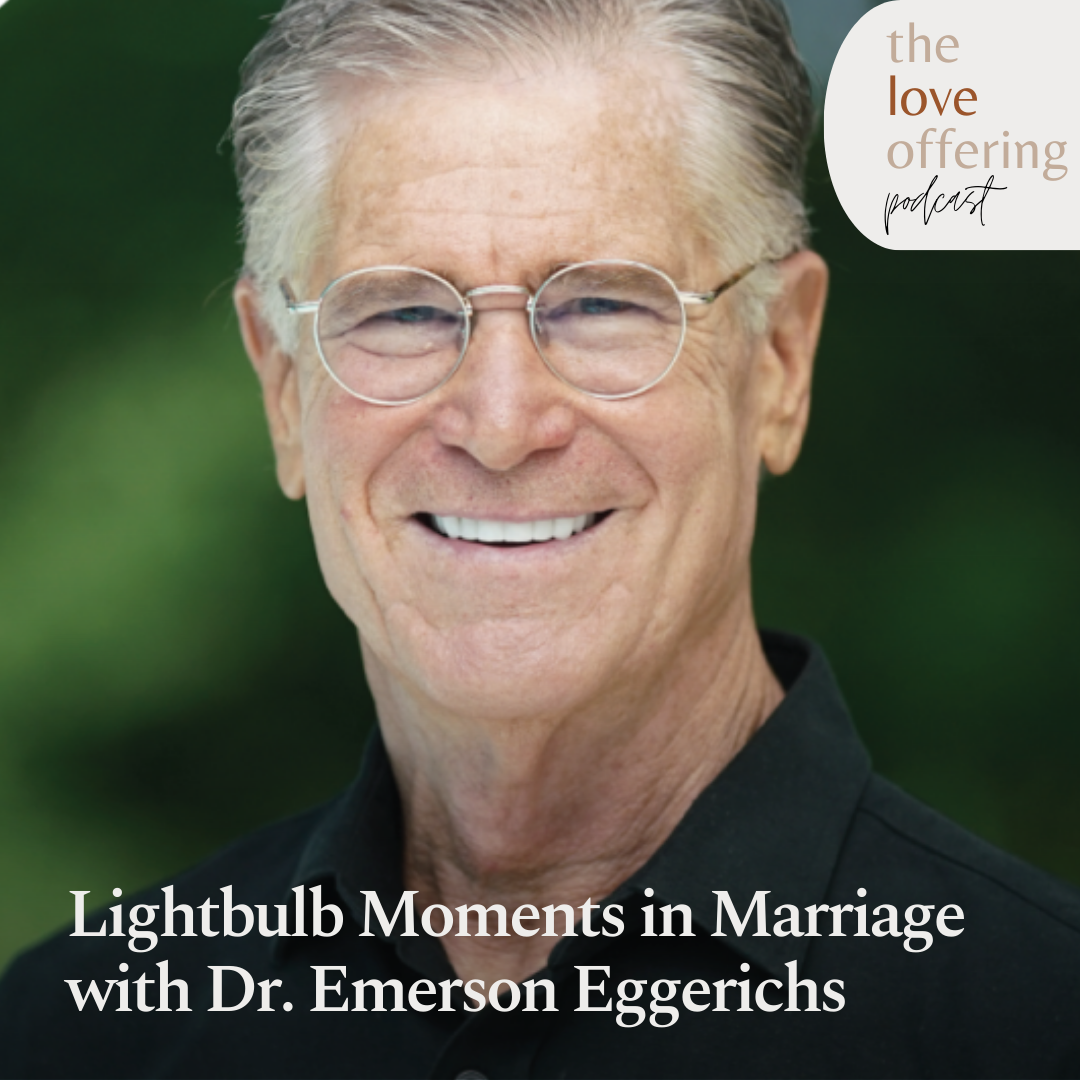In our fast-paced culture, plagued with burnout, stress, and chronic fatigue, we often find that we’re functioning out of emptiness. What would it be like to experience a truly lasting and regenerative fullness in our lives?
In Soul Care, licensed counselor Debra Fileta shows you how Jesus’ life rhythms can guide you to true health and rest, teaching you how to live full rather than empty. Rooted in Scripture and expertly informed by clinical psychology, Soul Care identifies six life-giving practices from the life of Jesus that address your whole person—mind, body, and spirit. As you are guided toward your own practice of biblical self-care, you will learn how
- the Bible responds to common myths about soul care
- a lack of soul care impacts your relationships, ministries, and careers
- to recognize the signs and signals of burnout and respond proactively with practical solutions
Empty people cannot fill up others. As you learn to be filled as Jesus was by intentional rhythms and practices, you will experience renewed energy, motivation, and strength to serve others as you never have before!
Summary
Deborah Flata discusses the importance of soul care and the six rhythms Jesus practiced to care for his soul: Nourish, Rest, Connect, Protect, Savor, and Tune In. She emphasizes the need to stay filled to continue pouring out to others. Deborah also addresses the common root causes of soul depletion and encourages listeners to prioritize self-care without guilt. She distinguishes soul care from self-care, highlighting the more profound and long-term nature of soul care. Deborah offers practical advice and resources for implementing soul care in daily life.
Takeaways
Soul care involves practicing the six rhythms Jesus modeled: Nourish, Rest, Connect, Protect, Savor, and Tune In.
Staying filled is essential for pouring out to others and fulfilling our calling.
Understanding the root causes of soul depletion, such as family dynamics and belief systems, is crucial for addressing and healing them.
Soul care goes beyond self-care and involves a long-term commitment to caring for our emotional, mental, spiritual, and physical health.
Implementing soul care can start with focusing on the weakest rhythm and gradually incorporating the other rhythms.
Loving ourselves is not selfish; neglecting ourselves can lead to self-obsession and burnout.
Soul care aligns our emotional, spiritual, mental, and physical health with our calling and purpose.
Practical resources for soul care include Deborah’s book ‘Soul Care,’ her podcast, and her network of trained counselors.
Chapters
00:00 Introduction and Background
03:40 The Importance of Staying Filled
08:55 The Nourish Rhythm: Taking Care of the Body
11:25 The Connect Rhythm: Cultivating Life-Giving Relationships
18:19 The Savor Rhythm: Enjoying and Being Present in Life
20:37 The Tune In Rhythm: Checking in with Emotions and Thoughts
25:07 Implementing Soul Care: Starting with the Weakest Rhythm
31:00 Aligning Heart, Soul, Mind, and Strength: The Essence of Soul Care
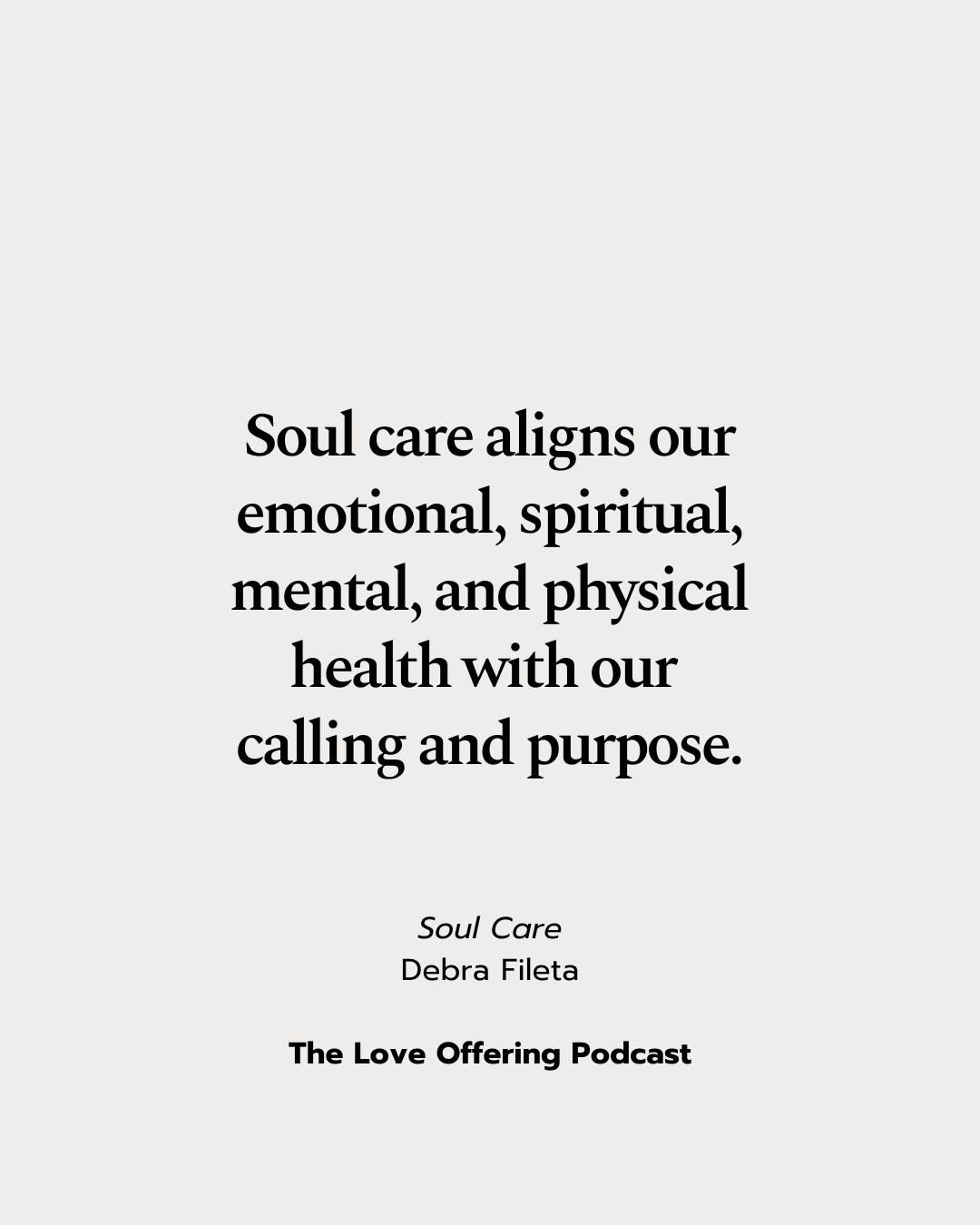
Transcript
Rachael Adams (00:13.954)
So, you are a licensed professional counselor. So, what drew you to this line of work?
Debra (00:19.397)
Yeah, I’ve always been interested in helping people. Since I was young, I have loved helping people, discussing deeper issues, and connecting with God and others. So God just really led me into this field. And it’s one of the best decisions I’ve ever made with my life and career.
Rachael Adams (00:44.714)
Yeah, it’s interesting because just today, a friend called me and asked if I had time for me to vent to you. And I said, yeah, go ahead. And she said, I just needed to hear your voice today and some affirmation. She’s like, you should have been a counselor. I’m like, I should have. Not that I had any good words to share, but sometimes that listening ear so people can vent is also needed because we all are going through it.
Debra (01:00.603)
Ha ha ha ha.
Rachael Adams (01:12.446)
So much is in our own lives, you know? I think everyone listening is probably saying, I’m feeling anxious about something, worried about something, stressed about something, just…
Debra (01:15.601)
Yeah.
Rachael Adams (01:24.854)
just feeling burnt out because you’re so tired from everything on our to-do list. And so I’m so excited about today’s conversation. Your latest book is Soul Care, Finding Life, Giving Rhythms, Live Restored, Avoid Burnout, and Discover Unspeakable Joy. So, when you wrote this book, what was your soul? How did you feel when you first started writing?
Debra (01:48.091)
What’s interesting is that I’ve always been a boundary person. Well, I shouldn’t say always because the way that I grew up was low on boundaries and high on ministry. And I kind of watched people burn out, get hurt, and have empty souls in ministry. And it just never felt healthy to me, even growing up. But as I’ve entered the world of ministry myself over the past decade, I’ve realized that people don’t fall from the heights of ministry because of a lack of spiritual knowledge. They fall because they lack emotional health, awareness, and staying connected to the vine and filled.
This isn’t something that comes naturally for everyone. So, over the years, I’ve defaulted to looking at my life as if it’s a tank and realizing that there are places where energy leaks out of that tank that I have to plug up with boundaries. But then I must also learn how to fill that tank to keep pouring out. One thing that my dad used to tell me growing up is that human beings are like wells.
If you want to keep giving and serving, you must stop and fill your well. Otherwise, you get to the bottom of the barrel, and there’s nothing left to give but the junk, you know, at the bottom of the well. And that really has stuck with me. It’s something that I practice in my own life as a counselor, a caregiver, and a mom. However, I have also seen the message be crucial to the people I serve as a counselor, ministry leaders, and caregivers. We have to learn to stay filled to keep pouring out.
Rachael Adams (03:50.146)
Absolutely. As I was preparing for this interview, you did quite a bit of research, and of course, just through your professional life, you understand and experience all of this daily. But I want to give everybody listening some statistics of what we’re talking about today. So, a recent poll by the American Psychiatric Association reports that anxiety levels are rising year after year and that three in four adults in 2024 are dealing with anxiety about the economy or the upcoming presidential election. Also, 80 % of employees are at risk of burnout, and 40 % blame exhaustion as a contributing factor. Yet, less than 50 % of employers integrate well-being into their approach to work. And Christians are not exempt. Americans have a productivity-obsessed culture, even within the church and ministry environments, which is what you just shared. It’s just wearing people down. But your book is a salve for stressed-out readers. I’d love to hear how so.
Debra (04:49.733)
The beauty of soul care is that I didn’t make it up myself. I see patterns, and I was able to articulate those patterns, but my primary source was looking at the life of Jesus. Sometimes, we look at Jesus and assume he will get it done, but we don’t stop; we serve everybody in every opportunity that comes our way.
If you think about it, Jesus only had three years, right? From the time he started his ministry when he was 30 to the time he was crucified at 33. He had three years of ministry. And you would think, if that were me, let’s get this done. There’s no time to stop. I’m going to sleep two hours a night, with no breaks. I have so many people to help save and serve. But that wasn’t how he lived his life. And as I studied the life of Jesus through the gospels,
I realized he was balanced, healthy, intentional, and clear on his calling and mission. It was easy for him to say no to the wrong things so that he could say yes to the right things—yes to the Father, no to man’s obligations. And so, through studying Jesus’s life, I saw six specific rhythms that I believe Jesus practiced to care for his soul. And these six rhythms are really in line with healthy psychology. It’s funny because sometimes we think we thought of this stuff, you know, in the field. It’s like, this is a great idea. But then, when you look at the life of Christ, it is all there if we open our eyes to it. So, there are six different rhythms that I guide you through in soul care. Each has a reason and a method, and each has a purpose to help you stay filled and block up the holes where your energy might needlessly be spent.
Rachael Adams (06:54.43)
I would love to, and we all need to get a copy of a book to explore these more. If that’s okay, I’d like to briefly walk through them all individually. So, the first on the list is Nourish. Tell us about this rhythm.
Debra (07:04.409)
Yeah. Nourish focuses on taking care of your body. And it’s sadly a very neglected area in the church. The world talks a lot about body, body health, and body image. But when was the last time you heard a sermon about taking care of your body as the temple of God, and what that means to take care of your body? So, the nourishing section focuses on hydration, nutrition, and healthy movement. It looks at how Jesus himself modeled these things. It talks about food, water, and movement. Each chapter focuses on how Jesus himself practiced some of these things. Ultimately, when we’re called to go to Judea and Samaria and the ends of the earth, how can we do that when we’re sick, tired, and weary?
When we haven’t taken care of our bodies or neglected them to the point of illness, so many people are not healthy. And I think sometimes we blame spiritual warfare. One of the chapters is called, “It might not be a demon; it might just be dehydration.” I think often, we blame the enemy for things when we’re participating in our demise. We’re self-sabotaging, like the enemy; it’s an attack. No, you must sit down for a minute, drink water, and ensure you’re hydrated. Maybe you need to eat healthy foods. Perhaps you need to practice movement. One of the fun facts throughout this book is that biblical scholars have determined that Jesus walked about 40,000 steps a day as they mapped out his paths from town to town. Walking was their primary mode of transportation. They didn’t have cars. They weren’t using horses except for the elite. The elite had horses and carriages, but your average everyday fisherman did not have that. And so they walked from town to town. That blows my 10,000-step goal out of the water. But we know that movement, specifically walking.
Rachael Adams (08:55.714)
real.
Debra (09:25.223)
Science and psychology show that they increase serotonin and dopamine. So, a 20-minute brisk walk in the day is like taking an antidepressant. It boosts serotonin and dopamine and helps your chemical alignment. Jesus did so many things that were healthy for his physical body. Nourish kind of zooms in on all of these things and how we can practice them in our own lives.
Rachael Adams (09:51.754)
You’re telling us it’s okay to eat carbs because you have lots of bread.
Debra (09:56.091)
You know, healthy carbs. I’m all about healthy carbs, that’s for sure. Healthy carbs and whole foods, such as whole grains, are so good for our bodies.
Rachael Adams (10:00.24)
you
Rachael Adams (10:07.924)
Yeah, no, I’m teasing. I completely agree with all that you just said. And that’s mind-blowing, but it makes so much sense about the number of steps he takes. The next is rest. And immediately, I’m thinking about him, like sleeping and napping on the boat. So I love that story.
Debra (10:16.902)
Yeah.
Debra (10:22.321)
That’s my favorite. One of my favorite stories is Jesus. I had t-shirts made that said Jesus took naps. Be more like Jesus because it’s a good reminder for those struggling to stop and rest. We’re being efficient, but it’s not just about taking a daily nap. This section is about rest. We assess your sleep hygiene, rhythms, and sleep patterns because they’re so important, but we also determine the amount of rest built into your schedule and the amount of margin built into your schedule. Are you living at max capacity, or do you have margin in your life, your schedule, your world, your everyday rhythms, your daily rhythms, your weekly rhythms, your monthly rhythms, and your yearly rhythms? What does rest look like? What does it look like to stop and pace yourself and be healthy? So that’s what we zoom in on in the section about rest.
Rachael Adams (11:21.538)
Okay, so the third is connect. Tell us about this one.
Debra (11:25.425)
Connect is all about life-giving relationships. And I think there’s a difference between life-giving relationships and draining relationships. There’s a difference between peer relationships, where we’re giving and receiving, and ministry relationships, where we’re only giving. But oftentimes, Christians are surrounded by ministry and discipleship relationships where they’re pouring out, pouring out, pouring out, and not being intentional about relationships where they’re getting filled.
This whole section talks about Jesus because he was a good friend. It talks about how Jesus selected his friends and engaged in friendship and life-giving relationships. It was just an elegant look into the life of Jesus and how he did some of these things, why friendship was necessary for him, how he gave to his friends, and how he also asked four things from his friends. So it was just a really neat look into Jesus as a human being and specifically in the way he made friendships.
Rachael Adams (12:30.826)
Yeah, absolutely. Okay, so the fourth is protect. Tell us about this rhythm.
Debra (12:35.215)
One of my favorites is that it’s all about boundaries and how we draw a line of protection around our lives and calling. We must protect the calling God has placed on our lives. And Jesus was so good at doing this. He was so good at being clear-minded, mission-minded, and focused on what God had called him to do. So he said a lot of no and not yet to people. And it was just really beautiful to watch him practice boundaries and the importance of boundaries and then take inventory of the boundaries that we set in our own life and what that looks like. So if you’re one of those people who has a hard time saying no, you’re spread too thin, you say far more yeses than nos in your life, and you find yourself bitter and exhausted and resentful at the end of the day, and it’s a really good section to spend some time in.
Rachael Adams (13:32.748)
It sounds like all of these sections are good to spend time in. I’m trying to listen, but I will order this on Amazon right after. We get all of it because I need it so much. And I’m even thinking about my children. Are you going to do a teen version of this?
Debra (13:34.865)
Hahaha
Debra (13:42.085)
Yes.
Debra (13:48.711)
You know, it’s interesting. I have a 13-year-old daughter going on 14, and I dedicated this book to her because she is the firstborn. She is a good kid. She does everything right. She’s a people-pleaser. She goes above and beyond in her nature to help. And there are reasons for that in our family dynamic. We’ve got some special needs that come as child number two, and she’s child number one.
Rachael Adams (13:52.77)
That’s 13 as well. Yeah.
Debra (14:18.085)
Certain dynamics cause you to be more of a person who gives versus receives because of the nature of the family dynamic if you’re not careful. And, before I even go into these six rhythms, the book’s first five chapters go into the why. Why are you depleted? Why do you give more than you receive? Why are you empty? Why do you tend to burn out? Because if we don’t get to the root of our why,
That’s usually a family-of-origin thing. It’s usually a belief system. It’s usually roles we carry in childhood that follow us into adulthood. I did a SoulCare podcast series. What’s going on now on my podcast is called Talk to Me, the Deborah Flata podcast, and its hotline on-air counseling. So, people call into the podcast, and we do these on-air counseling sessions. And we’re in a SoulCare series where people call in to share the rhythms they struggle with. It’s interesting how many firstborns have called in. I found that a fascinating fact. What about these firstborn, reasonable, responsible kids who are focused on everybody else’s needs but tend to put theirs on the back burner? It’s almost like there’s no room for my needs. So, all that to say, I dedicated this to my daughter because I already see traits in her of being responsible and overly responsible and want to make sure that she balances it out by staying filled so that she can keep doing what God has called her to do. 13 and up, this is a good read, especially if you’re reading with a parent and your mom or dad, you’re walking through this together, you’re going through the reflection questions at the end and processing together. It’s just such a good conversation to have with your teen children.
Rachael Adams (16:12.908)
I’m taking a break from our list for a moment, and I promise everybody will return to it. But why do you think this is the root of most people? Do you find a common theme in why our souls are so depleted?
Debra (16:28.113)
There are a few themes. One of them is, you know, in your family dynamic, there was chaos in some way. There was a lack of balance in some way. Maybe someone had higher needs than the other. Think of clients I have who maybe there was an alcoholic in the family, or maybe there was a disability in one of the children or an addiction in one of the family members. And so,
Those needs get loud, and you learn to put your needs on the back burner to maintain equilibrium in the family. Or you grew up in a home, I think of another client, an amazing Christian family, but there were 11 kids. And he felt like, okay, there’s not enough room here for my needs. And he even remembers asking his dad for something, and his dad was like, I got nothing left.
You automatically start developing the belief system that you cannot trust people with your needs, and you have to deal with your own needs or, better yet, silence them, put them on mute, put them on the back burner because there’s not enough here for you. And so, through life, we go through these experiences in our past and childhood that begin to shape the narrative that we believe causes us to behave in a certain way.
So, getting to the roots of why you get here repeatedly, why am I always here? Why am I saying yes when I, deep down, just want to say no, but I can’t? These are essential things for us to address, as well as places that God wants us to pay attention to and heal so that we can start doing it differently.
Rachael Adams (18:14.892)
Yeah, absolutely. We all want to call into your show and have a counseling session with you. It sounds like I need to call. Okay, the next is to savor. Tell us about this rhythm.
Debra (18:19.205)
You can do that. There’s a place to submit your question; maybe we’ll have you on.
Debra (18:31.579)
That was my favorite, the one that spoke the most to me. I’m an efficient person. I like to get things done. I like productivity. I’m a firstborn myself. But Savor was the chapters about enjoying life, celebrating life, and being present, not in the what’s next, but the what’s now, what’s in front of me. The other day, someone was at my house and asked, what is next for you in this season? I honestly thought about that. I answered quickly, but later on, I was processing that question, and the answer was that I didn’t want to focus on what was next. I tried to focus on what’s now. What is here right in front of me? The stage of life my kids are in. I have a three-year-old up to a 13-year-old. My parents are alive and well and healthy. My in-laws are healthy.
We’re in a stage of life that’s worth savoring, even with its hardships. And I want to be present. I want to be here. I don’t want to be thinking of what’s next. I want to be savoring, celebrating, and grateful for what is. And so that was just a beautiful section to write and to watch how Jesus was so intentional about savoring what is. Don’t worry about tomorrow.
What is today? What have I given you today? And how are you receiving it, enjoying it, and being present? There are so many distractions: our phones, our worries about tomorrow, our regrets from the past. So these chapters were all about enjoying life, savoring life, having fun, making the most of life, and being present. And it was just an enjoyable and beautiful few chapters to write.
Rachael Adams (20:31.996)
So good. Okay, so last but not least, tune in. Tell us about this one.
Debra (20:37.233)
As a counselor, this is my area of expertise. TuneIn is all about checking in with what’s happening underneath the surface with your emotions, thoughts, and feelings. What is going on underneath the surface? Are you tuned in to the signals of your emotions and inner world? The Bible says our hearts are like deep waters—proverbs 20 verse 5. The purposes of a person’s heart are like deep waters, but a person of insight draws them out. Do we understand the depths of what’s happening inside of us? Why do we do what we do? The thoughts and feelings we have. Jesus was so in tune with his feelings. The Bible displays 39 different emotions that Jesus experienced and expressed through scripture. He was so in tune with his feelings and didn’t just react. He responded healthily to every emotion that came up, from anger to sorrow to anguish to agony, compassion to grief to sadness to joy. He tuned in and responded to his feelings rather than what we do: ignore them, push through them, pretend they’re not there, or make light of them. And so it’s all about tuning into your emotions and being an emotionally healthy person. So, that was a really fun chapter to write as a counselor.
Rachael Adams (22:04.236)
This is so rich, and I cannot wait to read your book. I’m even just thinking about a retreat. I’m considering inviting you to my women’s church retreat to discuss this. This has been a good conversation; I’m mindful and included. I have been nodding and feeling every ounce of what you said today has been helpful. And so for the woman, which is probably all of us just feeling burnout, tiredness, stress, anxiety, and all the feelings. How would you encourage us all today? I know we’ve covered so much, and you’ve already given us so much information, but is there one piece of encouragement you’d share?
Debra (22:47.269)
Yeah, you must prioritize staying filled and keep pouring out to the people God has called you to. As women, we often feel guilty. We feel like it’s wrong or selfish. We have many wrong, misguided theological beliefs about caring for ourselves, nurturing ourselves, and being in tune with our needs.
But my encouragement is that if you want to keep pouring out the way God has called you to, you must stay filled. So, what does it look like for you to take that seriously and honor that calling to stay filled, to stay healthy so that you can keep doing what God has called you to do for the long haul? It would be best if you didn’t burn out because the opposite of letting your light shine brightly for the world to see is a light that’s been burnt out. And that’s not what God calls us to do.
Rachael Adams (23:48.29)
Yeah. How would you say you know soul care is different than self-care? Or are they similar?
Debra (23:56.207)
Well, soul care is deeper. When I think of self-care, I think of one-time actions like taking a bubble bath or getting a mani-pedi. That’s how the world defines self-care. All of those things are fun, and some of them are even important. Going for a walk is something I would consider a self-care strategy. But soul care is deeper because it’s not just a one-time action. It’s a rhythm that we practice a long-term rhythm of care rather than a one-time action that just puts the band-aid on, it’s a long-term rhythm of staying filled and assessing our rhythms. I have a quiz if you’re like, okay, which one of these, where do I need it to begin? If you go to DebraFoleta .com slash SoulCare quiz, I have a quiz that you can take. It takes you about five minutes.
It’s about 50 questions to answer quickly, and it’ll tell you which rhythm you’re the weakest in and which rhythm is probably leading you to burn out the fastest so that you can figure out where to begin with all of this.
Rachael Adams (25:07.468)
So this isn’t like a one; first, you need to nourish, and then you need to rest. It is more like we will do all of these most days. Like this is this year’s rhythm of life, not like, yeah, I’ve led you in those questions, and the book is in that form, but that’s not necessarily how we’re moving through them, right?
Debra (25:11.857)
Correct.
Debra (25:18.865)
Correct. Exactly.
Debra (25:26.539)
No, and you may need to start with one of the rhythms. You don’t need to start with all of them because it might feel overwhelming, and you might burn out trying not to be burnt out. But start where you’re weakest. Take the quiz, start where you’re weakest because that’ll be the most energy reserve when you start where you’re weakest, and then build on that with the different rhythms.
Rachael Adams (25:32.394)
Yeah.
Rachael Adams (25:50.58)
Yeah, that makes sense. Okay, so we’ll include that link in the show notes. And so the next question I’ve been asking all of my guests is: Is there a biblical concept of love that you feel applies to this topic? And I’m not trying to put words in your mouth, but immediately, I’m thinking of people going to be like, well, this is self-love; you’re paying too much attention to yourself. But anyway, you give your answer, that’s where my mind went.
Debra (26:11.983)
Yeah, well, let me start by saying I don’t think self-love is wrong. I think self-obsession is wrong. I think selfishness is wrong. But I think when Jesus says to love your neighbor as you love yourself, the assumption is that you’re going to love yourself. And you’re going to know how to love because humans are good at loving ourselves. He doesn’t say it’s wrong to love yourself.
Rachael Adams (26:21.111)
Yeah, good.
Debra (26:41.969)
He assumes that you’re going to love yourself, but the problem is that some people don’t. They don’t love themselves. They ignore themselves. They’re filled with shame, self-hate, self-doubt, and self-betrayal. Because of their past trauma, they feel like there’s something wrong with them, something dirty about them, something about them that’s not worth loving.
And honestly, when we’re not caring for ourselves and depleted, we become self-obsessed. Think about when you’ve been the most burnt out because of self-neglect. The only person you can think about at that moment is yourself. How bad do you feel? I can’t do anything. No one’s doing anything for me. I’m done. I’m, I’m, I’m, I’m. So it’s not to stop loving yourself or neglect yourself. It’s about having that balance of healthy self, soul searching, self nourishment, tending to myself, caring for this temple, not being self obsessed, but also not self neglecting.
Rachael Adams (27:50.486)
Yeah, a really good distinction. Okay, so Deborah, what is something you’re loving right now?
Debra (27:58.279)
I am loving the season of life with the kids, and it comes with hardships, for sure. Like suddenly, my mind could quickly face the difficulties of raising four kids in different stages. We have a toddler, an elementary schooler, a middle schooler, and a high schooler. But I’m opening my eyes daily to see the beauty of this season and just wanting to be present in it and love it. That’s what I’m loving in this season.
Rachael Adams (28:31.328)
You’re savoring, for sure. Yeah. Well, this has been such an insightful, helpful episode for me, and I want to continue diving into it. As you know, every woman listening right now is dealing with something, and we just want to tend to her soul right now. Would you do the honor of praying for all of us? Thank you.
Debra (28:32.849)
savoring.
Debra (28:50.341)
Yeah, I’d love to. Jesus, we thank you for being a good father and a good friend. We thank you, Lord, for calling us to stay filled, to sit under the living water of your presence and power so that we can be filled and then overflow into the lives of the people you have called us to.
I pray that you would help us take inventory of places where we’re not caring for ourselves in healthy ways, where we’re not honoring our body, and where we’re not honoring the calling that you’ve placed on our lives because we’re spread too thin. Please help us to be healthy in every area, mentally, emotionally, spiritually, and physically, to love you with our heart, soul, mind, and strength, and to stay filled so that we can keep shining bright. We thank you for convicting us, challenging us, and asking us to pay attention so that we can do things better. Help us to care for our souls, in Jesus’ amen.
Rachael Adams (30:03.796)
Amen. Your prayer made me think of one last question: Will you oblige me? The greatest commandment is to love the Lord God with all of our heart, mind, soul, and strength. And so much of what you’ve just talked about and shared is just all those elements. And so when we talk about our soul, it’s sometimes a little hard even to grasp what that is. How is the soul different from the mind, heart, and body? Do you have an answer to that?
Debra (30:14.584)
Absolutely.
Debra (30:27.473)
Yeah.
Debra (30:32.529)
The soul encompasses all of us inside, including heart, soul, mind, and strength. When I think of heart, soul, mind, and strength, I believe the heart represents our emotional health, soul our spiritual health, mind our mental health, and strength our physical health. So Jesus wants us to align all those parts with what he’s called us to. SoulCare is looking at all four compartments and assessing our performance in those areas.
Rachael Adams (31:09.378)
So, so good. Well, I know I loved today’s conversation. I’m sure listeners have as well, and I want to stay connected with you, and I’m sure they do. So you’ve mentioned your podcast and your quiz. Just tell us how we can purchase the book and stay in touch with you.
Debra (31:24.551)
Yeah, the best place to find me is on Instagram at Debra Fileta, F -I -L -E -T -A. And my website is debrafileta .com. You’ll find books, podcasts, and my blog there. I also have a team of 20 counselors, the Debra Fileta Counselors Network, who are trained counselors who integrate faith and psychology. If you’re stuck in an area of your life and you’re like, “I need a good counselor. Where do I find one?”
We offer online sessions across the country. You can find all of that information at DebraFoleta.com, Soulcare, or any of my six other books. They can be found anywhere books are sold, on Amazon, Barnes and Noble, or wherever you get your books.
Rachael Adams (32:10.678)
Wonderful. We’ll include all that in the show notes, but thank you. Today has been good for my soul, and I pray for everyone listening. Thank you for joining us.
Debra (32:17.681)
Thanks for having me.
Connect with Debra:
https://debrafileta.com/

